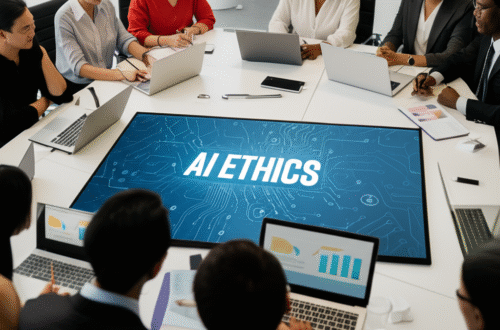Artificial Intelligence (AI) is rapidly evolving from a theoretical concept to a tangible force permeating nearly every sector of our global society. From powering personalized recommendations on e-commerce platforms to driving autonomous vehicles and assisting in medical diagnoses, AI’s increasing integration presents unprecedented opportunities. However, this technological revolution brings forth a complex web of legal and ethical challenges that transcend national borders. Understanding how different countries and international bodies are grappling with the oversight of AI, the ethical dilemmas it poses, and the imperative for global cooperation is crucial for navigating this transformative era.
The need for legal and ethical frameworks for AI stems from its inherent characteristics. Autonomous decision-making systems, capable of acting without direct human intervention, raise fundamental questions about responsibility and control. The real-world consequences of AI’s deployment in critical areas like self-driving cars (potential accidents), predictive policing (biased enforcement), and healthcare AI (diagnostic errors) underscore the urgency of establishing clear guidelines. Furthermore, the very nature of AI, often operating on data and algorithms that flow seamlessly across national borders, complicates traditional jurisdictional approaches to regulation.
Key Legal Challenges Posed by AI
The unique capabilities of AI present several novel challenges to existing legal systems worldwide:
Accountability & Liability
One of the most pressing legal questions is who is responsible when AI causes harm? In scenarios involving autonomous vehicles causing accidents, AI-driven medical diagnoses leading to incorrect treatments, or algorithmic trading resulting in market manipulation, attributing liability becomes complex. Is it the developer of the AI algorithm, the manufacturer of the system, the user, or even the AI itself (if granted some form of legal personhood, a highly debated concept)? Current legal frameworks, largely built around human agency, struggle to assign responsibility in these novel situations. Establishing clear legal pathways for accountability is crucial for ensuring redress for harm caused by AI and fostering trust in its deployment.
Intellectual Property
The increasing ability of AI to generate creative content, including code, art, and text, raises complex questions about intellectual property (IP) rights. Who owns the copyright to AI-created works? Is it the programmer who designed the AI, the user who provided the prompts, or is the AI itself the creator, thus potentially falling outside current IP frameworks? Similarly, the ownership of the underlying AI algorithms and the data used to train them are subjects of legal debate. Clarifying IP rights in the age of AI is essential for incentivizing innovation while ensuring fair attribution and preventing unauthorized exploitation.
Privacy & Data Protection
AI systems heavily rely on the collection, processing, and analysis of vast amounts of personal data. This raises significant concerns regarding privacy and data protection. How can individuals’ rights to privacy be safeguarded when AI systems collect and analyze data on an unprecedented scale? Issues such as data security, the right to be forgotten in AI-driven systems, and the ethical implications of using personal data to train AI algorithms are at the forefront of legal discussions globally. Existing data protection laws, like the EU’s GDPR, are being scrutinized for their applicability and effectiveness in the context of advanced AI.
Bias & Discrimination
As highlighted earlier, algorithmic bias can lead to discriminatory outcomes in various applications, from hiring and loan approvals to criminal justice. The legal implications of such bias are significant, potentially violating anti-discrimination laws and fundamental rights. Establishing legal frameworks to identify, prevent, and rectify bias in AI systems is crucial. This includes defining what constitutes illegal discrimination in an AI context, establishing standards for fairness in algorithms, and providing legal recourse for individuals harmed by biased AI decisions.
Global AI Ethics Principles
While legal frameworks are still evolving, a set of core ethical principles is gaining traction globally, aiming to guide the responsible development and deployment of AI:
- Fairness: AI systems should treat all individuals and groups equitably, without discrimination. This principle is echoed in the OECD AI Principles and the UNESCO AI Ethics Recommendations, emphasizing the need to mitigate bias and promote inclusive outcomes.
- Transparency: The workings of AI systems should be understandable to the extent possible, fostering trust and enabling accountability. The OECD AI Principles highlight the importance of transparency and explainability.
- Explainability: In critical applications, there should be mechanisms to understand why an AI system made a particular decision. This is a key aspect of the EU AI Act’s risk-based approach, particularly for high-risk AI systems.
- Non-maleficence: AI systems should be designed and used in ways that avoid causing harm. This principle aligns with fundamental ethical considerations and is implicitly embedded in various AI ethics guidelines.
- Human Oversight: Maintaining human control and intervention in critical AI decisions is considered essential by many ethical frameworks, including the OECD AI Principles and the UNESCO AI Ethics Recommendations, to prevent unintended negative consequences and ensure accountability.
AI Legal Frameworks by Region
Different countries and regions are adopting diverse approaches to regulating AI, reflecting their unique legal traditions, economic priorities, and societal values:
- European Union: The EU AI Act (proposed) takes a risk-based approach, categorizing AI systems into unacceptable risk (prohibited), high-risk (subject to stringent requirements), and low or minimal risk (few obligations). The GDPR also plays a crucial role in regulating the processing of personal data by AI systems. The EU’s approach emphasizes human rights and safety.
- 🇺🇸 United States: The US has adopted a more sector-specific approach, with regulations emerging in areas like AI in healthcare (through the FDA) and a focus on promoting innovation while addressing potential risks. The NIST AI Risk Management Framework provides voluntary guidelines for organizations developing and deploying AI systems.
- 🇨🇳 China: China exhibits heavy government involvement in both the development and control of AI. Recent draft rules focus on algorithm transparency and recommendation systems, reflecting concerns about data privacy and the potential for algorithmic manipulation. China’s approach prioritizes technological advancement alongside state control.
- 🇯🇵 Japan: Japan has largely adopted a “soft law” approach, promoting the ethical development and use of AI through guidelines and principles rather than strict legal mandates. Their focus is on fostering innovation while respecting human rights.
- 🇮🇳 India: India’s NITI Aayog has released ethical AI guidelines emphasizing principles like fairness, transparency, and accountability. The country is in the nascent stages of formulating comprehensive AI regulations, balancing the need for innovation with ethical considerations.
- Others: Countries like Brazil (debating a comprehensive AI bill), Canada (proposed AI and Data Act), Singapore (model AI governance framework), and the UAE (National Strategy for Artificial Intelligence) are also actively exploring and implementing their own unique approaches to AI governance, reflecting the global urgency of this issue.
Ethical Dilemmas in Practice
The theoretical ethical principles translate into complex dilemmas in real-world AI applications:
- Predictive policing and profiling: While aiming to prevent crime, these AI systems can perpetuate existing biases in law enforcement data, leading to disproportionate surveillance and targeting of specific communities.
- Facial recognition and surveillance: The widespread use of facial recognition technology raises serious concerns about privacy, freedom of assembly, and the potential for misuse by governments and corporations.
- Chatbots and misinformation: Increasingly sophisticated AI chatbots can be used to generate and spread misinformation at scale, posing a threat to democratic processes and social stability.
- Automated legal decisions: The prospect of AI judges or AI-powered risk assessment tools in the legal system raises questions about due process, the role of human judgment, and the potential for algorithmic bias to lead to unjust outcomes.
Need for Global Cooperation
Given the borderless nature of AI, fragmented national laws and ethical guidelines are insufficient to address the global challenges it presents. International cooperation is essential for:
- Developing unified global standards for AI ethics and regulation.
- Addressing the challenges of international consensus given differing legal traditions and national interests.
- Leveraging the role of international organizations like the UN, IEEE (Institute of Electrical and Electronics Engineers), ITU (International Telecommunication Union), and WEF (World Economic Forum) in shaping global AI norms and facilitating dialogue.
Case Studies
Examining specific cases highlights the complexities at the intersection of AI, law, and ethics:
- Clearview AI: The company’s practice of scraping billions of facial images from the internet without consent for its facial recognition database sparked widespread controversy and legal challenges globally, raising critical questions about privacy and data rights in the age of AI.
- COMPAS Algorithm: The use of this algorithm in the US criminal justice system to predict recidivism has been shown to exhibit racial bias, disproportionately labeling Black defendants as higher risk, illustrating the real-world legal and ethical consequences of algorithmic bias.
What Should Be Done?
Addressing the legal and ethical challenges of AI requires a multi-faceted approach:
- Encourage unified global standards: Promote international dialogue and collaboration to develop common principles and frameworks for AI governance.
- Balance innovation with human rights: Craft regulations that foster AI innovation while safeguarding fundamental human rights and ethical values.
- Promote open dialogue: Encourage ongoing discussions between governments, AI developers, researchers, ethicists, and the public to ensure a broad understanding of the issues and a collaborative approach to solutions.
Conclusion
Artificial Intelligence presents a transformative power that demands careful and proactive legal and ethical planning on a global scale. The challenges posed by autonomous decision-making, accountability, intellectual property, privacy, and bias require innovative legal solutions and a strong ethical compass. As nations navigate their own regulatory paths, the imperative for international cooperation becomes increasingly clear. The future of AI governance hinges on our ability to forge a global consensus that balances technological advancement with the fundamental principles of justice, fairness, and human rights.





